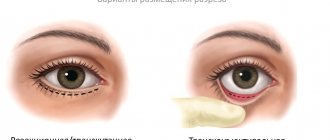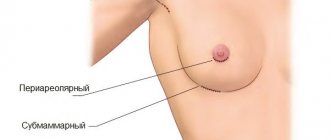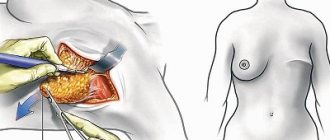Menstruation during rhinoplasty
People, help!
It turns out that my menstrual cycle moves forward by two days every month, and today I find out that my surgeon will be able to operate on me four days later than the previously agreed upon date, but the fact is that 95% of a hundred, which is exactly After these four days, my period may begin, then naturally no one will perform the operation. Is there any way to postpone my period with pills or something else? Is rhinoplasty strictly contraindicated if a girl has her period?
We are told that, of course, it is desirable that there are no critical days for the operation, but if this is the case, this is not a reason to cancel it.
Before the operation I was strictly told “no critical ones.” So I had to guess and set a date for the future operation, taking into account the characteristics of the body.
I don’t know what to do; they may or may not start. It’s better, of course, not to start, otherwise they’ll ruin the whole picture.
So contact your surgeon and ask him if he will operate in such a situation, why bother? They will start or not.
That’s the problem: I can’t contact him now, and he will only be available after February 5th, and even then not for sure. We'll have to wait until he calls the clinic and tells him exactly when he'll be back.
You have no idea how lucky you will be if they start. In general, you can perform operations no later than 10 days before the “critical” ones, or at any time after them, even the next day.
You see, if heavy bleeding begins during the operation, it will prevent the surgeon from calmly doing your nose because the bleeding will have to be stopped. And you go through more than one day with tampons in your nose like everyone else, but until your period ends. No sane doctor would allow surgery on such days.
Okay, we convinced you. I also started having a runny nose today, but I’m glad! and all because he will already be through the operation. I was simply afraid that it might start unexpectedly during the operation.
I also calculated that menstruation coincides with the operation. Maybe I can do it on the last day of my period? Or vice versa in the first? I have an agreement for any of the 5 days, it is during this period that “these days” will be. You don't have to delay your period, but call it earlier. But this is very harmful.
I'm tired of being tormented, I'll rely on chance, I think that everything will be fine. A friend of mine had Rhino done on the last day of her period, and she says everything went fine.
I heard that in recent days it is possible to have surgery. But in the beginning you can’t, you may start to have severe bleeding in the nose, bruises up to the neck and swelling like an experienced drunk.
In principle, rhinoplasty is a one-day operation, so eat more lemons, they curb the cycle, avoid alcohol and overheating, including baths. Good luck to you!
Before reno, I thought that this would be a problem for me, since I read that surgical interventions are not advisable during the menstrual cycle. Western doctors do not adhere to this rule (I asked a question) and believe that rhinoplasty can be performed during the menstrual cycle, the main thing is to inform the nurse who will prepare for the operation about this.
Hmm, there are some nuances... Why is this bad during a cycle?
Oh what are you talking about?! In general, everything is contraindicated for a girl during her cycle, not to mention plastic surgery. This is not only a physical, but also a psychological state.
And yet I think that if possible, it is better to skip all the dangerous moments and have plastic surgery during a safe period. Why take the risk?
During any operation, menstruation is at least unhygienic. Imagine, you won’t wake up immediately after the operation, and when you wake up, you will feel weak, and also these periods. Who will be from honey? staff to tinker with your gaskets?
It's actually very unhygienic. . I wouldn’t even think about this aspect from this side, to be honest. Or maybe menstruation is also bad because the uterus relaxes and bleeding may begin? Do not know?
An operation during this period is dangerous because the hemostatic drugs administered during the operation will rebuild your body, causing hormonal disruption, or may simply not work, so the operation needs to be moved.
In short, not only with rhinoplasty, but with any plastic surgery, you should not risk your health. That is, you should not do it during menstruation. Even if the doctor doesn't say anything.
Of course, it is better to foresee everything in advance, all possible negative consequences. Otherwise you will have to reap the fruits of carelessness. But the doctor’s position is not clear to me. Maybe he just doesn't know?
I think it's just some kind of blinding. When the doctor has simply said the same thing so many times that he simply forgets to say the same to you personally.
Well, you shouldn’t rely only on the doctor’s opinion. You definitely need to go through different blogs and forums and see who had what and what advice and recommendations they gave people!
Yes, sure! Pre-op jitters hit you, you don’t know what awaits you and how it will all end, what questions to ask whom. In short, a complete atas!
Yeah. It is difficult to imagine a person’s condition before surgery. There is fear and excitement here. and there is no need to worry. Is it dangerous. Nerves generally provoke all diseases.
This is all understandable, but I think that before you decide to have rhinoplasty, you need to determine for yourself whether you really need surgical intervention or not. Well, after making a decision, there is no need to doubt it!
And menstruation does not really affect rhinoplasty, only if it is done poorly and bleeds, then the bleeding will be a little stronger. That's all, but consult your doctor.
But I think that it’s still not worth the risk of having rhinoplasty during menstruation. Because the doctor may not guess: he will say that there is nothing wrong, and then shrug his shoulders.
If you do not know exactly your cycle, then consult your gynecologist so that he can prescribe pills that can delay your period. Of course, you will have to take hormonal ones. In general, do rhinoplasty after your period is over. In this case, you can't go wrong.
New on the site
Information
Read news in the community
18+ © . Electronic periodical "Medicforum". Registered by the Federal Service for Supervision of Communications, Information Technologies and Mass Communications (Roskomnadzor). Certificate El No. FS77-39067 dated March 09, 2010
Possible complications after surgery
The risk of these conditions increases when surgery is performed during menstruation:
- Formation of hematomas in the area of the postoperative scar. Due to a decrease in blood clotting properties, blood accumulation occurs more often. Treatment is conservative, in severe cases - surgical.
- Formation of rough scars. They occur when collagen metabolism is disrupted. These changes are most pronounced during menstruation.
- The appearance of pigmented skin changes in the postoperative area. Occurs with minor hemorrhages. As a rule, they disappear on their own.
- Purulent-inflammatory diseases in the area of the operated area. The reason for their appearance is excessive blood supply to the surgical field and a decrease in the local immune response of the body. Treatment is usually conservative.
- Inflammatory changes in the area of implant installation. They occur when metabolic and hormonal processes in the body change. Treatment is conservative with the use of antibacterial agents. Sometimes it becomes necessary to remove the implants.
- During laparoscopic operations, the risk of varicose veins of the anterior abdominal wall and internal bleeding increases. The favorable time for performing this type of intervention is considered to be the period from the fifth to the seventh day of the menstrual cycle.
If surgery is not an emergency measure to help the patient, the doctor will advise postponing the operation until a later date after the end of menstruation.
The period of menstruation is an absolute contraindication to elective gynecological surgical interventions.
Anesthesiologists, just like surgeons, will refuse to perform anesthesia for you. It is worth listening to the opinion of doctors, because these specialists are responsible not only for your health, but also for your life. Possible complications as a result of the operation performed during menstruation increase the risk of an unsuccessful outcome.
Thus, if surgical interventions are the only method of cure, then it is necessary to prepare for this carefully. Passing the mandatory list of tests and undergoing a series of instrumental studies is only part of the preparation. Together with the doctor, it is necessary to select and discuss the date of the operation, outside the days of menstruation.
If the arrival of menstruation was unplanned, for example, when it was provoked by severe stress, you should inform your doctor about this. In this case, the doctor will decide on the likelihood of performing the operation on these days or postpone it to another date.
How long does swelling last after rhinoplasty?
After rhinoplasty, swelling lasts from 5-7 days to 4 months, depending on the complexity of the nose job. External swelling after rhinoplasty lasts a maximum of two to three weeks. Internal swelling after rhinoplasty can last up to three to four months.
You can speed up the regeneration process and reduce nasal swelling after rhinoplasty with the help of special procedures and medications. Most often, doctors recommend microcurrents and various cosmetic treatments that help quickly reduce swelling after rhinoplasty.
Is it possible to smoke before surgery?
During consultations, many of our patients ask, “Can I smoke before surgery?” The answer is clear: you can’t smoke before surgery! One of the effects of nicotine is the constriction of blood vessels, which leads to a decrease in the amount of oxygen in the blood, which is so necessary for tissue healing. Smoking before surgery will slow down the recovery process. This is why stopping smoking 2 weeks before surgery and several weeks after will help the healing process.
At what age do rhinoplasty begin?
Legally, you can perform rhinoplasty from the age of 18; with written permission from your parents, rhinoplasty can be performed from the age of 16-17.
For urgent medical reasons, rhinoplasty is performed even on children, but aesthetic rhinoplasty is best done after the formation of the bony facial skeleton, namely after 21. It is after this age that the result of aesthetic rhinoplasty will be more lasting and predictable.
Rhinoplasty during menstruation - is it acceptable? We strongly do not recommend rhinoplasty during menstruation and 3 days before the start of the cycle. The fact is that at this time hormonal changes occur in a woman’s body, and blood clotting decreases. Rhinoplasty during menstruation is often accompanied by heavy bleeding both during and after surgery.
Swelling and hematomas increase significantly. There is a very narrow group of patients who can undergo rhinoplasty during menstruation. If the patient has a period with scanty discharge, asymptomatic and unnoticeable, then we can perform rhinoplasty. However, we emphasize once again that it is highly undesirable to do this, even if the risks specifically in your case are significantly reduced.
Any operation is a surgical intervention and an important period in the life of every patient. We need to approach this issue very responsibly and scrupulously. We ask you not to be shy and warn about any changes in your body. Even if you have been waiting for the operation all your life, we will try to reschedule it on any convenient day. We are very concerned about the health of each patient, so, our dears, be attentive to yourself! We are waiting for you at Elle Clinic.
Rhinoplasty - does it hurt? All patients are interested in the question “does rhinoplasty hurt?” Rhinoplasty, like all major operations, is performed under anesthesia, so you don’t feel anything during the operation. After plastic surgery, the nose is fixed with a plaster cast on the outside and turundas (special dressing material) on the inside, so patients do not feel any pain in the bones and tissues.
During the first days after rhinoplasty, breathing is difficult due to the presence of turundas and blood clots, all of which interfere with proper breathing. Many patients complain of pain arising from dry mouth while constantly breathing through the mouth. This is what causes the main discomfort and pain. Rhinoplasty is not painful! You just need to endure the postoperative period a little and after a week enjoy life with a new nose!
What happens to excess skin after liposuction?
Our skin is very elastic and automatically tightens itself according to new contours. However, in areas with severe sagging, natural resources may not be sufficient and in this case it may be necessary to remove excess skin (abdominoplasty, thigh lift, etc.). During a face-to-face consultation with our plastic surgeons, you can get answers to all your questions and decide on a treatment plan for your specific situation.
Is pregnancy safe after abdominoplasty (tummy tuck)?
Pregnancy after abdominoplasty (tummy tuck) is not dangerous, but there is a certain risk that the results of a tummy tuck will be lost. The abdominal muscles may stretch again and the abdomen will return to its pre-operative condition. This is why we do not recommend planning a pregnancy after abdominoplasty.
Does a breast lift change its size?
The breasts generally remain the same size as before the lift, although they may appear smaller due to differences in placement. During the operation, a small amount of skin is removed, which most often does not change the size of the breast.
In order to thoroughly prepare for a future surgical intervention and not be refused the operation at the very last moment, you should know whether it is possible to have plastic surgery during menstruation. There is disagreement between plastic surgeons and general surgeons on this issue. Evaluate the arguments of both sides and make your own choice.
Only a doctor can decide whether to undergo surgery during menstruation or not. It is important to correctly assess the likely risks during surgery. First of all, an individual approach to each patient and several diagnostic procedures are required.
If surgery is performed during or immediately after menstruation, the following complications may occur:
- purulent inflammatory process;
- poorly healing scars;
- hematomas;
- bleeding;
- strong pigmentation.
Noticeable scars remain because the patient's collagen processes are disrupted. This failure is temporary, so if you have the opportunity to reschedule the procedure, you should take advantage of it.
Since blood clotting is sharply reduced, severe bleeding may occur on the operating table, which is why the slightest impact on the skin is accompanied by the formation of hematomas that will not go away for a long time.
During menstruation, it is undesirable to perform not only gynecological operations. During this period, it is worth postponing all other interventions, even going to the dentist. It is not recommended to resort to cosmetic procedures such as tattooing, lifting and skin tightening.
It should be noted that specialists did not notice any specific complications that occur exclusively in women operated on during menstruation. But operating doctors note that in such patients the risk of problems with recovery is much higher than in other patients.
For example, plastic and cosmetic surgeries are planned in 99% of cases. Nevertheless, there are ladies who do not want to wait a few days; they do not take doctors’ warnings seriously. What is the danger of such carelessness?
Due to the more liquid composition of blood, bruising occurs more often at the site of tissue dissection. Usually they resolve on their own, sometimes additional physiotherapeutic procedures and ointments are prescribed.
It is widely believed that a clearly visible suture can only remain due to insufficient qualifications of the surgeon. Unfortunately, scars arise due to the individual characteristics of the body, namely the metabolic processes of collagen. During menstruation, these features may be most pronounced. This problem is fixable; the scar is polished or smoothed using special injections.
They arise due to hemorrhages in the surgical field. Most often they disappear on their own within a few months.
Is it possible to have rhinoplasty if you have a runny nose? Tips + Photos and Videos
Rhinoplasty in questions and answers. Is it possible to have rhinoplasty if you have a runny nose, and what are the main contraindications for surgery?
Rhinoplasty is the most complex plastic surgery aimed at changing the shape of the nose from the inside; patients may need it both after an injury and to solve cosmetic defects.
There are absolute and relative contraindications to any plastic surgery.
But what if you have chronic rhinitis or get sick right before surgery?
The most frequently asked question from patients
Is it possible to have rhinoplasty if you have a runny nose, or should it be postponed?
Experienced plastic surgeons definitely say yes, it’s worth delaying the operation.
It’s more difficult with sinusitis. When the sinuses above the upper jaw become inflamed and not treated in a timely manner, sinusitis becomes chronic. This can be fatal for the patient due to the possibility of complications. The operation is not only postponed, but also serious conservative treatment is prescribed. Constant weakness, migraines, fever are prohibited symptoms for surgery.
In case of colds and allergic rhinitis, the operation must be postponed; due to the illness, the body is very weak and is not ready for the recovery period.
At what age can you have rhinoplasty?
Recommended age: 20 to 40 years. Before age 20, bones and cartilage have not yet fully formed, so surgery may be ineffective and cause harm.
After 40 years, it is advisable to use other types of correction to prevent eye complications and a difficult period of healing and rehabilitation. In any case, a doctor’s consultation is necessary; there are often cases when a small child needs surgery after suffering an injury and it is simply impossible to postpone it.
What needs to be done before surgery? Describe the process and recovery period
It is necessary to pass a standard set of tests, undergo fluorography and ECG, and make sure that there are no absolute contraindications to rhinoplasty.
Immediately before rhinoplasty, the surgeon conducts at least 2 consultations with the preparation of a computer model of the expected changes. Next, there is a meeting with the anesthesiologist, and then the operation itself.
Rhinoplasty is performed under general anesthesia and lasts about an hour.
Many people believe that the recovery period is very painful. In fact, the patient experiences discomfort only for up to 3 days, until the drainage from the nostrils is removed.
A splint is applied to the operated area to prevent damage and facilitate rapid resolution of swelling.
The plaster cast is removed after 7-10 days.
Bruising and bruising above and below the eyelids may be present for a maximum of 2 weeks; this is a natural process.
Full recovery and improvement in appearance occurs in a couple of months.
Are repeat operations necessary?
In 95% of cases, no complications are observed; in rare situations, further surgical intervention is possible, but only after at least six months.
What are the absolute contraindications to rhinoplasty?
Severe form of diseases of internal organs, blood diseases (clotting disorders).
Is hepatitis C an absolute contraindication?
The most serious infectious disease causing the liver has 2 phases: inactive and active. Few surgeons agree to perform surgery, but only in the inactive stage. The most important point is to ensure that staff are fully protected from infection and informed of the possible consequences. The presence of such a serious illness cannot be hidden from employees.
At what stage of diabetes can surgery be refused?
If there is 10 mmol/l glucose in the blood, a person develops a decompensated stage of diabetes mellitus. In this case, doctors will definitely refuse to perform the operation. The worst consequence after surgery for diabetes is the development of tissue necrosis.
Are there any vision limitations?
You may be denied surgery only if urgent measures to save your vision are necessary. In other cases, there are no contraindications.
The only caveat is that for the first 3 months you won’t be able to use glasses, only lenses.
Final recommendations
If a situation arises that it is impossible to do without the help of a surgeon on the road to recovery, you should carefully prepare for this. But be sure to pass all the tests and undergo the appropriate examination prescribed by the doctor - that’s not all. You should discuss the date of the scheduled surgical intervention with a specialist, and if it coincides with critical days, jointly choose the time when it will be possible to perform the operation.
If your period does not come as scheduled due to strong worries, you need to inform the doctor about this to change the date of the operation. In the event of a non-emergency situation, the doctor will decide on what day the event can be scheduled, taking into account the fact that the tests taken are considered valid for 2 weeks.
Relying on “maybe” in matters of one’s own health is at the very least frivolous, and sometimes even dangerous. Therefore, hiding important information about your condition from doctors is often fraught with consequences that cannot always be quickly eliminated.
Unconventional issues
Question to the anesthesiologist, what should I do if I have asthma?
After a face-to-face consultation with a specialist, it is possible to resolve this issue. If it is possible to select gentle operations for anesthesia, then the operation can be performed.
Is it possible to have rhinoplasty during menstruation?
Definitely no. Also, the period of pregnancy and breastfeeding is completely prohibited. After the end of lactation, surgery can be scheduled only after six months, in order to allow the body to recover.
Is it possible to have rhinoplasty in summer?
There are no contraindications regarding the time of year. But it is worth considering the possible inconveniences that you will experience in extreme heat or cold. If you have the opportunity to limit your stay on the street during the postoperative period, then there are no prohibitions.
Cosmetology procedures
At the very beginning of the menstrual cycle, you cannot carry out deep chemical peeling of the skin, this is fraught with reactions due to hormonal imbalance. Unforeseen consequences and allergies are often observed in patients after lifting procedures, skin tightening with threads, cosmetic tattooing, tattooing, Botox injections, etc., carried out during menstruation.
All women know that chemical or even regular hair curling, coloring and cutting do not bring the desired results during menstruation. Many people consider this simply superstition, but only until the first unsuccessful experiment on themselves. Unfortunately, surgery is not like dyeing your hair; failures here are unacceptable and can have the most dire consequences. If you have the opportunity to delay the operation, do it, don’t take unnecessary risks!
Despite all of the above, in European countries not a single doctor will cancel a planned operation due to the wrong period of menstruation. It is believed that no features of the body’s hormonal and circulatory systems during this period can cause harm or complicate the operation. In the last few years, among Russian doctors, the theory that menstruation is an absolutely normal natural state of a woman has become more widespread.
Is it possible to have surgery during menstruation?
In the post-Soviet countries, it is believed that it is undesirable to perform a surgical procedure during monthly bleeding. In Europe, doctors are inclined to believe that for many women it is better to have surgery during this period.
They explain this advice by the presence of increased immunity in women at this time, which allows wounds to heal faster. In addition, they claim that rehabilitation is easier for these patients - the time frame is reduced, and hormonal changes occur without any special complications.
At the same time, available statistics indicate the correctness of the first opinion. However, regardless of the country of residence of the doctor and the patient, sometimes surgical intervention is simply necessary. This can manifest itself in a situation where a woman’s life is at risk and every minute is important. In such cases, not a single qualified physician will refuse to perform surgery on a woman during her period.
In emergency cases, the operation will be performed on any day, even during menstruation
MONTHROOM AFTER LAPAROSCOPY
How many days will it take to get my period after laparoscopy? It all depends on the purpose of the surgical intervention, as well as the individual characteristics of the female body. As mentioned above, surgery for women is performed mainly on days 5-7 of the cycle. If laparoscopy is strictly performed within the specified period, the menstrual cycle will not be disrupted, and menstruation should come on time. If they did not arrive on time, this does not indicate the presence of violations. You should wait, because often if failures are observed, then with a slight difference of several days.
Do not be upset if the delay after surgery is up to three months. This effect is a normal reaction of the body to surgery, especially if the procedure was performed on the reproductive organs.
It is important to know! If discharge does not appear for more than 3 months in a row after surgery, you should contact a gynecologist.
To restore hormones, the doctor will prescribe special hormonal medications. If your period does not come after a course of drug treatment, then a detailed examination is necessary.
If a woman after surgery discovers that the discharge is more aggressive in nature, then there is no need to worry, as this is also considered normal. In addition, you need to know that the first menstruation can be painful. There is no need to sound the alarm, because this phenomenon is normal.
How to delay the onset of menstruation
If a woman is healthy, then her periods come regularly after the same period of time. Due to emotional turmoil, the cycle may be disrupted, and critical days will come earlier or later, for example, due to anxiety before surgery.
If you are concerned that your period will begin on the day of surgery, you can try to delay your period by several days.
You can change the onset of menstruation with the help of medications:
- OK should be taken 3-4 days before the expected start of the cycle, and there will be no contraceptive effect;
- if such tablets have been taken previously, then a new package should be started immediately after the previous one, without taking a week's break;
- By the end of the second phase of the cycle, you can take medications that contain progesterone: if its level is maintained, your periods will begin later.
Time-tested folk remedies are considered a safer and more gentle method of delaying menstrual bleeding. These include the following recipes:
- Nettle infusion. It is necessary to brew the leaves of the plant and take 100 ml twice a day three days before the start of the cycle.
- Tansy decoction. It is recommended to take 200 ml daily two days before your expected period.
- Parsley decoction. Should be taken 200 ml for three days.
To prepare infusions, you need a few tablespoons of plants, which need to be poured with boiling water and kept on fire for about five minutes. Then cool and strain through a fine strainer.
Why interference is prohibited
Surgeries are serious medical interventions that involve injury. These procedures are often performed under anesthesia (general or local). Surgery is prescribed only when treatment with medications does not lead to the desired effect.
Surgical intervention always leaves an imprint on the patient’s nervous system, especially since it is stressful for women during menstruation. This period is marked by significant changes in the body at the hormonal level (affecting the hematopoietic system), and this can cause the development of severe complications.
Any operations during menstruation become a risk for the future health of patients, which is why doctors try to postpone the intervention itself for some period.
During menstruation, blood clotting rates decrease, and this can contribute to the development of internal bleeding while the doctor performs all sorts of manipulations or complicate the period of rehabilitation and healing of scars.
During menstruation, the risk increases due to low blood clotting
In addition, surgical intervention is prohibited due to changes in the hematopoietic system, and this is associated with the risk of various infections. The occurrence of inflammation or the development of pigmentation in the area of the operation due to the high blood supply to the area that underwent emergency intervention cannot be ruled out. Suppuration may immediately appear.
During menstruation, the hormonal levels of each representative of the fairer sex change greatly, and the body can behave completely differently. For example, anesthesia does not work because the sensitivity threshold is reduced. Doctors, pointing to the above manifestations, note the prolongation of the rehabilitation period in patients who have undergone emergency intervention during menstruation. Women may experience an increase in temperature and the development of severe pain that manifests itself in the area of the scars.
Surgical intervention in the gynecological field during menstruation is also a direct contraindication. Doctors also believe that thyroid surgery during menstruation is undesirable.
It is known that with hypothyroidism, the menstrual cycle is disrupted, menopause occurs in such patients much earlier, and an insufficient amount of thyroid hormones (T4, T3) leads to miscarriage. In addition, triiodothyronine and thyroxine ensure the normal functioning of the ovaries and the cyclicity of menstruation. In this regard, any intervention during critical days without an urgent need is highly undesirable. Often after such an operation there are no periods for a long time.
Surgeries on the thyroid gland are not recommended at this time.
Why can't operations be performed?
The period of menstruation is accompanied by serious processes that are important to consider when planning an operation.
Therefore, surgical intervention during this period can lead to a number of complications.
The second important reason for refusing surgery during menstruation is that there is a deterioration in blood clotting. This is directly related to the first factor and threatens the occurrence of difficult-to-control bleeding.
During menstruation, it is not recommended to take anesthesia drugs for the following reasons:
- the body's sensitivity to drugs increases, which requires dosage adjustment;
- the pain threshold decreases;
- The reaction to some medications changes, so the results of the studies may be incorrect.
If the operation is performed during menstruation, the risk of infection increases in the body, since it is weakened and the immune defense is suppressed.
The main reason why operations cannot be performed during menstruation is that at this time the body’s hormonal levels change and, as a result, the risk of complications increases, and the rehabilitation period may take longer than usual and with complications. Doctors are extremely reluctant to undertake strip operations due to the fact that a woman’s blood has a much lower level of coagulation during menstruation than usual. And this threatens uncontrolled bleeding, which is life-threatening for the patient.
In addition to surgeons, anesthesiologists are the most often opposed to performing operations during menstruation. They justify their decision with the following reasons:
- decreased or increased sensitivity of patients to usual doses of medications;
- reduced pain sensitivity threshold;
- decrease in the body's defense reactions (immunity).
In addition, the choice of method and drugs for anesthesia is made based on the results of tests taken earlier, and they may be unreliable if the study was carried out during menstruation. The hemoglobin level will probably be lowered due to significant blood loss at this time. Also, in a general blood test, the level of red blood cells, white blood cells, platelets, and hematocrit will most likely be underestimated.
But the ESR indicator, on the contrary, increases. The result of a biochemical blood test may show an unreasonably high level of blood clotting, which is observed exclusively at the beginning of the menstrual cycle.
Urine and stool tests should not be taken earlier than five days after the end of menstrual bleeding, as otherwise the results will be greatly distorted. Thus, the doctor, without having information that you are having “critical days,” may erroneously make a conclusion about health problems.
For all gynecological operations (except emergency ones), menstruation is a direct contraindication. Also, planned intervention is not carried out two to three days before the start of menstruation. As a rule, most of them are prescribed on days 7-10 of the menstrual cycle, that is, after the end of bleeding, but before ovulation.
The dentist will also give you a categorical refusal. You will have to either endure or hide the presence of menstrual bleeding. But the second option is extremely undesirable; it can cause harm much more serious than a bad tooth.
Why can you have rhinoplasty during your period?
Not very competent plastic surgeons explain their refusal to operate during menstruation with three facts:
- Increased chance of bleeding;
- Increased swelling and hematomas;
- Difficulty maintaining hygiene during surgery.
Firstly, the viscosity and coagulability of blood increases during menstruation. That is, the risk of bleeding is even lower than on normal days of the cycle. Moreover, modern plastic surgeons and anesthesiologists have a lot of effective means to stop intraoperative bleeding, if it happens (although menstruation itself cannot provoke it).
Secondly, the severity and size of edema and hematomas after rhinoplasty do not depend on the menstrual cycle, but on the professionalism of the medical team. We use various medications to control and prevent swelling during rhinoplasty. And severe hematomas are typical for patients who have undergone osteotomy and resection. Aesthetic medicine has already developed techniques for performing less traumatic and more effective surgical corrections of the nose, and we use them.
Thirdly, intimate hygiene of a woman during menstruation is available even on the operating table. This issue is resolved individually, but in any case, no one has canceled absorbent tampons, which last for 4-6 hours even with heavy menstruation. This time is enough for both rhinoplasty and recovery from anesthesia. General anesthesia in plastic surgery today is a far cry from what caused chills, nausea and dizziness for 3-5 hours after surgery. We use the latest generation drugs so that the patient returns to consciousness as quickly and painlessly as possible.
There are no obstacles to performing rhinoplasty during menstruation. It is only important to find a competent plastic surgeon who will carry out an impeccable procedure, regardless of the day of the cycle and other imaginary “interferences”.
When surgery is prescribed even during menstruation
In cases where it is necessary to prescribe an operation, the doctor always tries to prioritize. Assesses the patient's condition and decides whether it is worth urgently interfering with the functioning of the organ during menstruation or whether surgical intervention can be delayed for several days. Complications after surgery can be quite serious, so before deciding on a date for surgery, you need to set your priorities.
If the need is serious, the woman is scheduled for surgery as soon as possible. In this case, it does not matter on what day her period begins or ends.
When is the best time to have surgery?
When the procedure has already been prescribed, the question naturally arises: what to do if menstruation begins these days. Some doctors believe that this fact does not interfere with the procedure.
Other experts say that it is highly inadvisable to operate on a woman while she is menstruating. Before determining the time of planned surgery, they are always interested in the expected start date of the cycle.
But even in this situation, the risks of an unfavorable outcome are high, since the level of hemoglobin in the body drops and blood clotting decreases.
The optimal time for the operation is 6-8 days from the start of the cycle until the egg is released. If menstruation occurs earlier than expected, it is important to notify the surgeon about this. Most likely, the doctor will reschedule the date.
The effect of ovarian cysts on a woman’s periods and menstrual cycle
An ovarian cyst can appear for various reasons. Most often, its formation is provoked by an unexploded egg before ovulation. Such neoplasms often cause discomfort to patients, interfere with pregnancy and can affect menstruation. Pain and other symptoms increase as a new cycle begins. In some cases, a cyst before menstruation may resolve and come out along with other discharge. However, large lumps require medical treatment or surgical removal.
Rhinoplasty: answering questions
Rhinoplasty is one of the most popular plastic surgeries. And one of the first in terms of the number of questions asked. We have collected questions for the week from the social networks of plastic surgeons at the GALAXY Beauty Institute and are sharing with you the answers of our doctors.
How long does swelling last after rhinoplasty?
Everything is individual. Noticeable swelling and bruising disappear within 2-3 weeks. To speed up the rehabilitation process, the GALAXY Beauty Institute offers three free procedures or a paid extended rehabilitation course. (Staisupov V.Yu.)
How to care for your nose after surgery?
Surgeon E.A. Siverina recommends rinsing your nose with saline solution. Each nostril is irrigated separately, the second at this moment is slightly covered with the thumb, the wing of the nose cannot be pressed. The remains of the drug are blown out with an open mouth. The procedure is repeated at least three times a day for 3-4 weeks. To soften the mucous membrane and prevent the formation of crusts after treatment, peach oil is instilled into the nose. If correction of the nasal septum was performed simultaneously with rhinoplasty, rinsing is not performed.
Will the bridge of the nose become wider if the hump is removed?
No, the back width will remain the same because the bones move after the hump is removed. (Staisupov V.Yu.)
Why choose us?
Experts of the first magnitude in Russian surgery
The largest team, 20 years of experience in plastic surgery
Author's methods, original developments
High-tech equipment, the latest surgery department
Our results speak for us
The price includes all expenses
Other materials on rhinoplasty
More than half of the patients who contact the Beauty Institute for surgery to correct the shape of the nose (rhinoplasty) are asked to remove the hump. This small protrusion significantly changes facial features, giving them...
Septoplasty is an operation to correct the shape of the nasal septum. It is carried out both on its own and simultaneously with correction of the shape of the nose. In this case, the intervention is called rhinoseptoplasty.
Closed rhinoplasty is a nose correction surgery performed through internal incisions. It does not leave visible scars, does not injure the area of skin between the nostrils, but at the same time allows...











